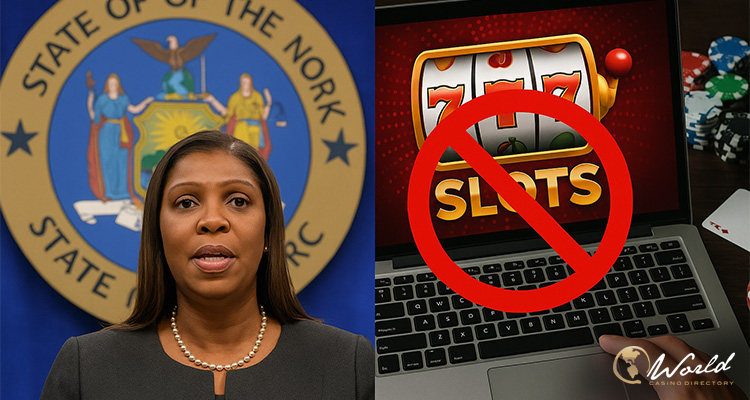In a sweeping enforcement action, New York Attorney General Letitia James has brought operations at 26 illegal sweepstakes casinos to a halt, citing state gambling laws that prohibit online platforms from offering games involving the exchange of valuable virtual items for cash or prizes. The move comes after an investigation conducted in coordination with the New York State Gaming Commission (NYSGC) determined that these websites were violating state law by providing unregulated casino-style games and sports betting services.
These platforms used a system in which players acquired virtual sweepstakes coins to wager on games like slots, blackjack, and sports events. Although these coins were often bundled with free or promotional currency, they could ultimately be redeemed for real-world rewards such as money or gift cards—a practice the state deems unlawful.
“Online sweepstakes casinos are illegal, dangerous, and can seriously ruin people’s finances,” said Attorney General James in an official statement. “I thank the New York State Gaming Commission and Senator Addabbo for partnering with my office on this issue to protect New Yorkers.”
Risky and Unchecked: The Dangers of Virtual Coin Wagering
Unlike licensed gambling operators, sweepstakes casinos function outside the purview of state regulatory oversight. This means no audits, no consumer protection checks, and no guarantees regarding the fairness of gameplay or the safeguarding of user data. The Attorney General’s office emphasized that players using these platforms had no way of knowing whether the games were manipulated, whether winnings would be honored, or whether their personal information was secure.
“Players deserve better than to be misled by schemes that offer the illusion of legality,” said NYSGC Chairman Brian O’Dwyer. “These so-called ‘sweepstakes’ games are unscrupulous, unsecure, and unlawful. I have been very vocal about the need to crack down on these operations, and I am thrilled that Attorney General James has taken this significant step to eradicate the illegal gambling market.”
Senator Joseph Addabbo, a vocal critic of these platforms and sponsor of legislation targeting such models, warned of the broader consequences. “These so-called sweepstakes casinos not only put individuals at risk of fraud and financial exploitation, but they also create dangerous pathways for gambling addiction, especially among minors,” he said. “This is not about taking away anyone’s livelihood, it’s about protecting New Yorkers and working toward a safer, regulated online gaming environment for age-appropriate individuals.”
Enforcement Actions Lead to Mass Exit from New York Market
In response to cease-and-desist letters sent by the Attorney General’s office, all 26 identified sweepstakes casino operators have agreed to stop offering sweepstakes coin purchases to New York residents. The companies named include major names in the industry such as Chumba, Global Poker, LuckyLand, and Fliff. Some, including operators owned by VGW, had already begun winding down their activities, with full service closures scheduled by August 1.
Assemblywoman Carrie Woerner, chair of the Assembly’s Standing Committee on Racing and Wagering, also underscored the dangers of these platforms for younger users. “These online sweepstakes games can serve as the on-ramp to problem gambling for teenagers, particularly. I am grateful for the work of Attorney General James and her staff for shutting down 26 of these games.”
A total of 26 platforms are affected, including: Chanced, Chumba, DingDingDing, Fliff, Fortune Coins, Fortune Wheelz, Funrize, FunzCity, Global Poker, Golden Hearts Games, High 5 Casino, Jackpota, Luckyland, McLuck, Mega Bonanza, NoLimitCoins, Play Fame, RealPrize, Sidepot, SpinBlitz, Sportzino, SweepSlots, Sweeptastic, TaoFortune, Yay Casino, and Zula Casino.
Industry Pushback Amid Growing National Scrutiny
The enforcement action in New York is part of a broader national trend toward greater scrutiny of sweepstakes-based gambling models, which often attempt to operate in regulatory grey areas. Similar legislative crackdowns have already passed in states like Montana, Connecticut, and Louisiana.
In response to New York’s ban, the Social and Promotional Games Association (SPGA) issued a statement expressing disappointment. The group argued that sweepstakes platforms operate legally under federal law and urged for a more cooperative regulatory dialogue. “Despite multiple attempts to engage directly with New York lawmakers and regulators, our outreach has gone ignored. Instead of working collaboratively to establish clear, modern rules… the state has opted for overreach,” SPGA stated.
Still, New York officials remain firm in their stance. They maintain that the sweepstakes model violates state law whenever virtual items redeemable for cash or prizes are wagered in games of chance, regardless of whether players pay directly for the opportunity to win.


